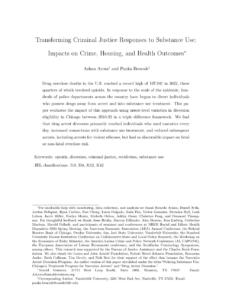New Jersey Portfolio

The Crime Lab is partnering with the New Jersey Administrative Office of the Courts (AOC) to help strengthen reforms to the state’s criminal justice system introduced in 2017, including eliminating cash bail and introducing a risk assessment tool to aid in pretrial release decisions.
Challenge
Ending cash bail and introducing the Public Safety Assessment to aid release decisions have facilitated a sizable reduction in the pretrial jail population. However, ongoing challenges remain unresolved, such as reducing racial disparities in the jail population and better accounting for risk for particular offenses like domestic violence.
Opportunity
The Crime Lab is working with the New Jersey Courts to identify, implement, and evaluate modifications to the Public Safety Assessment so that the underlying policy choices in the tool’s design better support the state’s pretrial reform goals: limiting the use of pretrial detention and reducing racial disparities in the system while maintaining public safety.
Project overview
In 2017, New Jersey took the bold step of eliminating cash bail, breaking the long-held link between a defendant’s ability to pay and whether they would be jailed while awaiting trial. At the same time, New Jersey introduced a pretrial risk assessment tool to help guide judges to reserve pretrial detention for only the highest-risk defendants. The state’s sweeping reforms—including creating a statewide pretrial services program and sharing more information with defendants early on—seek better to balance people’s right to freedom and public safety.
New Jersey’s reforms have become a model for jurisdictions around the United States, where, on any given day, nearly half a million people are being held in jail prior to their trial. Other cities and states seeking to reduce their reliance on pretrial detention are looking to New Jersey for evidence about what works. So far, the results are promising, including a 30% drop in New Jersey’s jail population without significant increases in violent crime. However, as the changes continue to take hold, the state will need to both make adjustments so the changes can fulfill their promise and resolve ongoing challenges such as reducing racial disparities in the jail population and better accounting for risk for particular offenses like domestic violence.
That is why the Crime Lab is partnering closely with the New Jersey Administrative Office of the Courts (AOC). By leveraging the unprecedented “big data” from New Jersey’s comprehensive criminal justice data infrastructure, Crime Lab will work with the AOC to help further strengthen the reforms to benefit the state’s 9 million residents and also to help provide a model for other jurisdictions around the country that are looking to the experiences of first-movers like New Jersey in the area of criminal justice reform.
Years Active
2020 – present
Topics
Project Leads
Zubin Jelveh
Assistant Professor, College of Information Studies at the University of Maryland

Greg Stoddard
Senior Research Director


Transforming Criminal Justice Responses to Substance Use: Impacts on Crime, Housing, and Health Outcomes
This paper evaluates the impact of diverting individuals who possess drugs away from arrest and into substance use treatment in Chicago between 2010-2022.

Agent-Based Model of Combined Community- and Jail-Based Take-Home Naloxone Distribution
This paper outlines the impact and cost-effectiveness of naloxone distribution, particularly for people facing criminal justice involvement.

Empirical Analysis of Prediction Mistakes in New York City Pretrial Data

Brookings Institution Commentary: Making the invisible epidemic visible
Using new data from a large urban trauma center in Chicago, we document substantial under-reporting of domestic violence at the time of receiving medical care.
